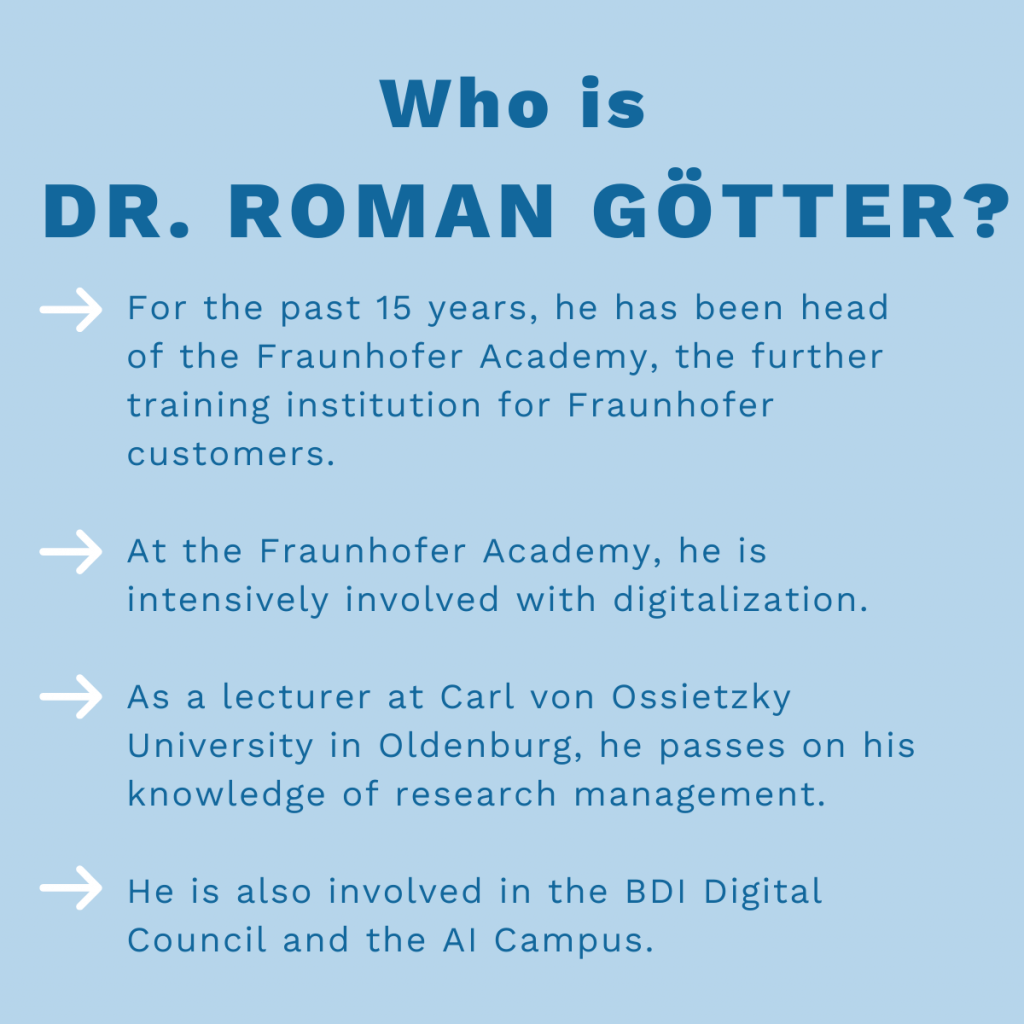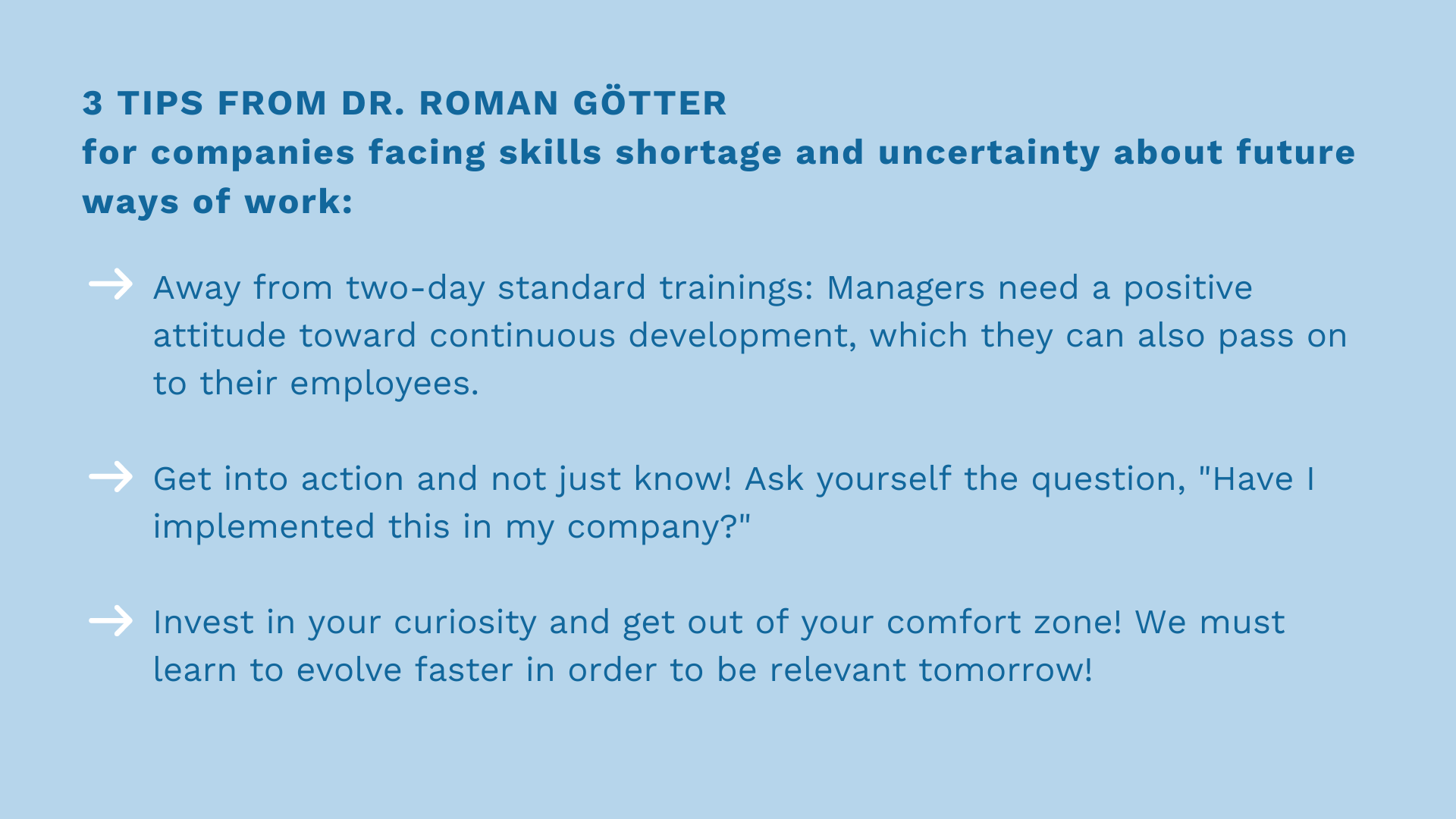The opportunities of a constantly changing world of work
Dr. Roman Götter’s expertise on the skills shortage
Skills shortage, the establishment of new job profiles, changes in the way we work – these are just some of the buzzwords that are causing headaches among managers these days in connection with digitalization. Jan Veira talked about this in a podcast episode with Dr. Roman Götter, head of the Fraunhofer Academy. The Fraunhofer Academy is the central provider of further education in the Fraunhofer Gesellschaft.
Find out here the great chance that he sees in these supposed problems!


What will the working world of tomorrow look like?
Many people are asking themselves the above question, as digitalization and Industry 4.0 are bringing with them a completely new way of working. In many companies, it is not yet clear how work will continue in the future, what will be clarified digitally or face-to-face, and who needs to be able to handle which digital solutions.
However, these soft skills and hard skills do not yet answer the crucial question that many teams are asking themselves today: How should we continue to work?
What professions will Germany need in the future?
The answer to this question is complicated by the fact that not only the way we work is changing, but also the professions themselves. In addition to the shortage of skilled workers that already exists in Germany, completely new job profiles are emerging due to digitalization. People with vocational training in digitalization topics are in demand, but rare. Companies therefore need to find solutions other than recruiting new skilled workers. Roman Götter explained one of these in more detail in the podcast:
Preparing employees for the new working world
"The attitude toward employees has to be: `You're great today, and we want you to be great tomorrow.'"
Dr. Roman Götter
According to Roman Götter, managers need this motivating and long-sighted mentality in order to use the uncertainty about future working methods and job profiles as an opportunity: instead of replacing well-trained employees with better qualified ones, investing in the existing team can:
- establish a contemporary way of work (New Work) in the company, and
- counteract the shortage of skilled workers by employees learning new skills, acquiring in-depth knowledge, and learning how to deal with new technologies.
3 steps to perfect up- and reskilling
Roman Götter is convinced that financing a two-day training course on digitalization for employees is not enough. To make reskilling and upskilling successful in the long term, the expert believes that investments are needed in three areas:
1. Establishing a lifelong learning mentality
Instead of seeing the end of school or education as the end of learning, employees should be encouraged to constantly go through the world with their eyes open. “We need to get away from our basic German mentality and stop dwelling on old models and hoping that they will continue to work,” says Götter. To keep up with the times, employees, employers, and society as a whole must always be learning.
2. Integration of digital methods
New technologies can make further education more attractive, less complicated, and more exciting. According to Roman Götter, the basis for this must be a “clever mix of stable video conferencing systems, learning management systems and other tools” that enables interaction not only with but also between learners.
But this is far from exhausting all the digital methods for continuing education:
- Virtual and augmented reality can replace the haptic journey to the training so well that learners get a feeling of "being there" and feel encouraged to participate.
- Artificial intelligence can be used to make the behavior of other learners visible. Personalized tips that indicate where someone else had success can motivate learners.
- Blockchains can be used to securely map educational certificates after the completion of continuing education.
3. Investment in employees
